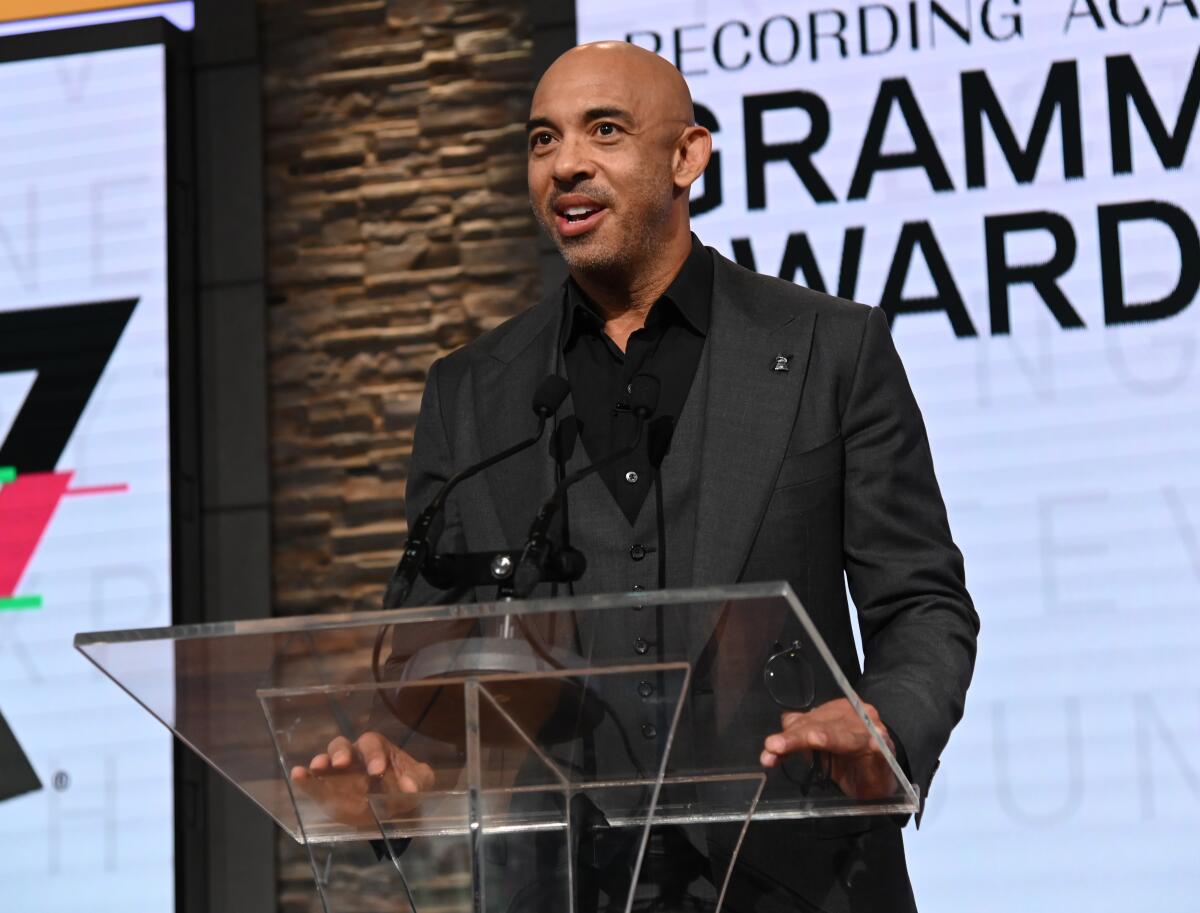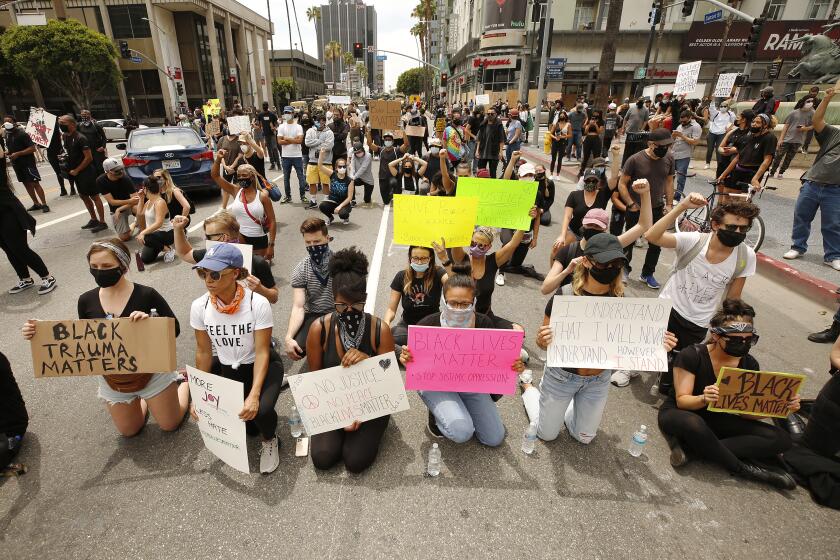Recording Academy renames ‘urban contemporary’ category for Grammy Awards

- Share via
“Puffy’s clock is ticking.”
That’s how Harvey Mason Jr. described the deadline for change at the Recording Academy, where he’s served as interim president and chief executive since the group’s previous leader, Deborah Dugan, was ousted in an explosive scandal involving charges of discrimination and vote-rigging just weeks before January’s annual Grammy Awards ceremony.
Mason was referring to an impassioned speech delivered the night before the Grammys by Sean “Diddy” Combs in which the veteran producer and executive also known as Puff Daddy challenged the academy to clean up its much-publicized messes — not least a perceived lack of respect for Black artists and for hip-hop — by the time of the 2021 show.
A singsong soundbite of a woman playfully mocking a security guard while being detained has become a popular chant at protests and a viral hip-hop hit.
“Y’all got 365 days to get this s— together,” Combs told a roomful of industry insiders, including Mason, at a pre-Grammy gala at the Beverly Hilton.
Of course, that was before the music industry, along with the rest of the world, was thrown into disarray by the COVID-19 pandemic and the once-in-a-generation protest movement sparked by the police killing of George Floyd in Minneapolis last month.
Yet Mason, 52, is sticking to his timetable, he insisted ahead of Wednesday’s announcement of several rule changes for the 63rd Grammys set to take place Jan. 31 at Staples Center — guidelines pertaining to the use of the word “urban” in one category and to the committees that help steer the academy’s controversial nominating process. (Songs and albums released between Sept. 1, 2019, and Aug. 30, 2020, are eligible for consideration.)
Unlike many in the music business, which has seen countless live events canceled due to the pandemic, Mason — a songwriter and producer known for his work with Jennifer Hudson and Whitney Houston and on the movies “Dreamgirls” and “Sing” — was also confident that his flagship production would proceed in some form as scheduled next year.
“We’re planning on a couple of different tracks [for the Grammys telecast], and we’re kind of running the plans simultaneously,” he said, describing one scenario that features an event with a live audience as usual, another with “a social-distancing audience” and a third “with almost no audience.”
“At different times it’s felt like, should we even be worrying about a show? There’s so many important things going on in the world,” he said. “But great art can be a respite. And I think it’s important for us at the academy to make sure that we honor the music that’s coming out this year.”
As for his own role at the academy, Mason — who originally stepped in alongside Dugan as the group’s chairman in 2019 — said he’s committed to the job through next May. The search for the academy’s next permanent CEO “has definitely been impacted by the virus,” he said, adding that widespread stay-at-home orders have made it difficult to interview candidates as thoroughly as he’d want.
“So I’m going to continue to do the job.”
In a statement, the Grammys’ diversity task force said that “those seeking to make ... reforms need to be supported, not impeded.”
Among the rule changes for the 63rd ceremony, the academy is doing away with a guideline that prohibited artists who’d released a certain number of tracks from competing for best new artist; the adjustment, Mason said, was designed with an eye on hip-hop acts — a rapper such as DaBaby, for instance — who might release dozens of tracks on mixtapes before releasing an official debut album.
The academy also is changing the name of the urban contemporary album category to progressive R&B album — an acknowledgment of the fraught history of the word “urban” that Tyler, the Creator emphasized in a speech at January’s ceremony when he called it “a politically correct way to say the N-word.” Last week Republic Records announced that it would no longer use the term to describe music by Black artists. (Other changes by the academy include a slight reclassification for Latin pop and Latin rock prizes and a renaming of the rap/sung performance category as melodic rap performance.)
Additionally, the nominations review committees — which Dugan alleged were little more than a forum for backroom favor-trading — now will require members to disclose any potential conflicts of interest they might have with artists competing for Grammys. Anyone with such a conflict will be barred from the committee in question, the academy says, and anyone caught concealing a conflict will be barred from participating in the future.
Asked if the committee changes came as a result of Dugan’s criticisms, Mason said no. “We don’t adjust based on criticism — we adjust based on the growth of our organization and what’s going to be our role in the ever-changing industry.” Still, he added, the academy wanted to “leave no doubt” about a voting process he described as “clean and pristine.”
Mason said he’d been pondering the Recording Academy’s leadership position as protests about racism and social justice quickly grew around the country — protests he said his father, 73-year-old jazz drummer Harvey Mason, took part in. (Mason Jr., who got married last weekend, said he hadn’t marched in the streets.)
“I think every organization is trying to find its footing and trying to find where they stand on things — or not where they stand but where they’re willing to stand,” he said. “What they’re willing to talk about.
“The academy hasn’t always done everything perfect. There have been mistakes. But the academy has an obligation to use its platform — and for me to use my personal platform — to make change.”
Recalling Combs’ unsparing address in that hotel ballroom, Mason said, “I sat there after just having handed him a trophy and shook his hand, and when he started talking about the academy — that was a 45-minute speech — it didn’t offend me and it didn’t make me angry,” he said. “It made me listen.”
Asked if he had any regrets about Dugan’s exit and the uproar it caused — last month Dugan updated a wrongful-termination complaint with the Equal Employment Opportunity Commission — Mason said, “I wish we didn’t take any attention away from the artists and the music. I’ve been nominated and been on those stages, and those moments are for the creators, not for anything else.”
Yet some at the Grammys seemed gratified that the controversy had created an opening for important conversations about how — and upon whom — the academy confers its prestige.
“But I came in prepared to have those conversations,” Mason replied. “I would’ve reached out to Puffy and other people who have dissenting opinions to learn and listen.
“I didn’t need all the chaos to understand that we needed to look at things.”
More to Read
The biggest entertainment stories
Get our big stories about Hollywood, film, television, music, arts, culture and more right in your inbox as soon as they publish.
You may occasionally receive promotional content from the Los Angeles Times.











